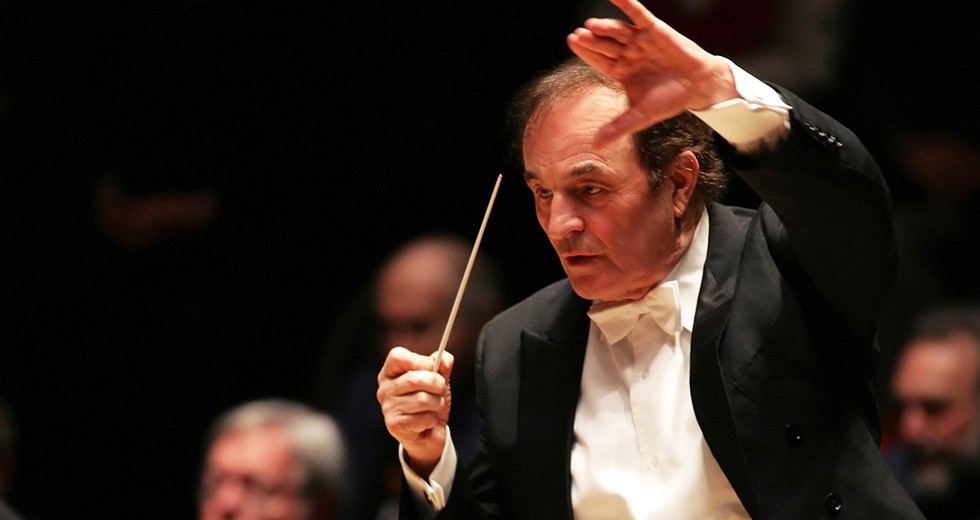
Ask Charles Dutoit about his recent activities, and he ticks off a long list of engagements with major orchestras around the world, including his duties as principal conductor and artistic director of London’s Royal Philharmonic Orchestra. At age 78, the Swiss-born conductor, perhaps best known for his long tenure from 1977 through 2002 as music director of the Montréal Symphony Orchestra, is clearly not slowing down.
He did have to cancel a set of concerts in the fall with the Los Angeles Philharmonic because of tendonitis and some arthritis in his shoulder, which he said can be painful at times. “But it’s under control,” he said. “I can work normally, so it’s fine.”
Dutoit, who is returning to the Chicago Symphony Orchestra for two sets of concerts beginning March 12, said he always looks forward to what has become an annual engagement with the orchestra. He has conducted the ensemble many times in his career and has witnessed several changes of its musical leadership, including the arrival of Riccardo Muti as music director in 2010.
“Muti is a fantastic conductor and a great disciplinarian,” Dutoit said. “Obviously, the orchestra reflects his leadership. But the orchestra has always been excellent. I remember all these years, and it has always been a great pleasure to work with them. They are very fast and they understand quickly, and we can do all sorts of things during the concert — we can change this or that, and they have this flexibility.”
At Symphony Center, Dutoit will lead two programs of well-known and not so well-known French works as part of a season-long emphasis on French music that culminates in May with “Reveries and Passions,” a three-week festival led by guest-conductor Esa-Pekka Salonen. “One plays a lot of Mahler,” Dutoit said. “One plays a lot of Shostakovich — a lot of Brahms and Beethoven. But a lot of French music has been ignored or is not played any longer.”
Major works by Impressionist composer Maurice Ravel will be featured on both programs, including Suite No. 2 from his 1912 ballet, Daphnis et Chloé, which will close the March 12-17 concerts. Any successful performance of the piece, Dutoit said, depends on achieving a refined quality of sound. “One can play Ravel without so much rehearsal time,” he said, “and it will always sound correct and decent because the orchestration is so fantastically well made. But in order to go two or three degrees above that, one has to work on the balance and the sound — this is the most interesting part of it — and, of course, the charm of the music, and these incredible colors which came in the orchestration.”
He compared Ravel’s music to a prism, dispersing a sunbeam into the colors of the spectrum. “This is exactly Ravel,” Dutoit said. “One has to display all these colors. Whereas as, say, a German orchestration, such as Bruckner, is just the opposite. It takes all these things inside and it has one round, beautiful sound. So it’s just the opposite school.”
Symphonic Fragments from The Martyrdom of Saint Sebastian (1911) by Claude Debussy, the other great French Impressionist composer, will serve as a centerpiece of the March 19-21 performances. A kind of oratorio, the five-act musical work is written in the structure of a medieval mystery play, with a text by Italian author Gabriele D’Annunzio. Although it is occasionally performed in its entirety, more frequently heard are these excerpts, which last about 20 minutes. Also on this program will be Saint-Saëns’ La muse et la poète (1910), a romantic duo concertante for violin, cello and orchestra, with famed cellist Yo-Yo Ma and concertmaster Robert Chen as soloists.
The rest of the two programs offer a look at 19th-century French Romanticism, including works by two composers who were virtual contemporaries: César Franck (1822-1890) and Édouard Lalo (1823-1892). Franck’s Symphonic Variations (1885), for piano and orchestra, will feature French-Canadian soloist Louis Lortie, with whom Dutoit has collaborated extensively. Ma, the CSO’s creative consultant, will serve as the soloist for Lalo’s Cello Concerto (1876), which will be heard during the March 19-21 programs.
Also featured will be Vincent D’Indy’s Symphony on a French Mountain Air (1886), which is one of the few works by the composer still regularly performed. “It’s interesting to have a look at the late Romantic period in France before the Debussy — Ravel opening of the 20th century,” Dutoit said. “I hope it’s going to be interesting for the public.”
Before returning to the CSO, Dutoit led two weeks of performances with the Boston Symphony Orchestra, including that ensemble’s first-ever performances of Polish composer Karol Szymanowski’s 1926 opera, King Roger (Król Roger). The conductor has long championed the rarely heard work, leading its New York and Paris premieres as well as its debuts in Japan and Canada. Dutoit studied the works of Szymanowski at the conservatory in his native Lausanne, Switzerland, where the composer died in 1937. “There is a piece for violin and piano, called Three Myths, with a famous movement called La Fontaine d’Aréthuse, and that was a very popular piece at the time,” he said.
In the early part of his career, Szymanowski (1882-1937) was influenced by Richard Wagner and Richard Strauss, but he later found a new, more progressive musical voice after travels in Italy and North Africa. It is the works of this second period that have long fascinated Dutoit, including the composer’s two violin concertos and especially King Roger, which the conductor calls Szymanowski’s masterpiece.
As far as Dutoit knows, the opera has never been presented in Chicago. “Maybe I should try to propose it,” he said. “But it’s a huge thing. You need an enormous chorus, a children’s chorus and some very special soloists who must sing in Polish, so it’s not so easy.”
Kyle MacMillan, former classical music critic of the Denver Post, is a Chicago-based arts writer.